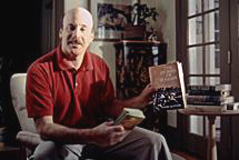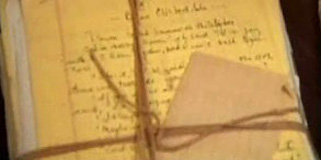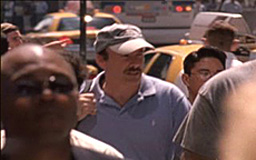Stone Reader (Mark Moskowitz, 2002)
 Stone Reader, Mark Moskowitzís
unremittingly good-natured personal documentary about his epic quest to locate
the obscure one-time author of a novel from his adolescence is so eminently
likable that I almost feel guilty as I prepare to point out some of my problems
with it. Certainly a quality film thatís this modest and this low-key needs
all of the positive exposure it can get, and since Mr. Moskowitz spends as much
time in front of the camera as he does during its running time, it only makes me
feel more like Iím complaining about a person than a work. Because the film
succeeds so well at helping the audience to understand the personal obsessions
of the filmmaker, to find much fault with it at all seems way too harsh. The
intellectual journey it takes is of a sort thatís too rare in the movies,
founded out of the same kinship of ideas and the desire for profound connection
that makes reading so pleasurable in the first place, and as such it makes the
fanatical, almost disturbingly obsessive goals of Moskowitz easier to relate to.
Stone Reader, Mark Moskowitzís
unremittingly good-natured personal documentary about his epic quest to locate
the obscure one-time author of a novel from his adolescence is so eminently
likable that I almost feel guilty as I prepare to point out some of my problems
with it. Certainly a quality film thatís this modest and this low-key needs
all of the positive exposure it can get, and since Mr. Moskowitz spends as much
time in front of the camera as he does during its running time, it only makes me
feel more like Iím complaining about a person than a work. Because the film
succeeds so well at helping the audience to understand the personal obsessions
of the filmmaker, to find much fault with it at all seems way too harsh. The
intellectual journey it takes is of a sort thatís too rare in the movies,
founded out of the same kinship of ideas and the desire for profound connection
that makes reading so pleasurable in the first place, and as such it makes the
fanatical, almost disturbingly obsessive goals of Moskowitz easier to relate to.
 The little-known book that prompts the journey in Stone
Reader is Dow Mossmanís ďThe Stones of SummerĒ, a monstrous tome that
was championed by The New York Times upon its release in the early Ď70s as one
of the defining novels of its generation before it faded into obscurity due to
an indifferent market and a corporate takeover. After an abortive first attempt,
avid reader Moskowitz puts away the book as a teen, rediscovering it almost
thirty years later, only to find it one of the most amazing modern novels he had
read. Frustrated at his initial attempts to find either more work from or any
biographical data about Mossman, or even another person who has read the book in
question, Moskowitz, a director of photography by day, picks up his camera and
begins a search that will take him across the country several times and span
several years. Along the way, he questions literary critics, professors, and
publishers in the hopes that heíll find information that will lead him to the
elusive Mossman. This gives the audience a peek at his passive aggressive
tendencies, which feel more endearing than annoying because his passion is
properly relayed.
The little-known book that prompts the journey in Stone
Reader is Dow Mossmanís ďThe Stones of SummerĒ, a monstrous tome that
was championed by The New York Times upon its release in the early Ď70s as one
of the defining novels of its generation before it faded into obscurity due to
an indifferent market and a corporate takeover. After an abortive first attempt,
avid reader Moskowitz puts away the book as a teen, rediscovering it almost
thirty years later, only to find it one of the most amazing modern novels he had
read. Frustrated at his initial attempts to find either more work from or any
biographical data about Mossman, or even another person who has read the book in
question, Moskowitz, a director of photography by day, picks up his camera and
begins a search that will take him across the country several times and span
several years. Along the way, he questions literary critics, professors, and
publishers in the hopes that heíll find information that will lead him to the
elusive Mossman. This gives the audience a peek at his passive aggressive
tendencies, which feel more endearing than annoying because his passion is
properly relayed.
 Stone Reader is punctuated by ambient interludes
featuring voiceover narration relaying Moskowitzís thought process, perhaps in
an attempt to overcompensate for the frequent, genuinely entertaining sequences
that show his trips online and to libraries to hunt for leads in his search. The
most intrusive of these asides feature his son, who sometimes plays a surrogate
for his fatherís metaphorical lost youth, but the device is beyond clumsy in
execution. (The closing images of him reading a Harry Potter book seem to be
clearly lodged against the anti commercial vibe that colored the filmís
perception of the publishing industry up to that point, for example.) Worse
still, it's at these moments that the film's penchant for praising the
audience's desire to read becomes most pronounced. As
annoying as these scenes feel, though, they might be necessary to make sense of
a journey thatís been chronicled on scraps of leftover film during the
directorís free time. Life, in the form of his job and obligations to finance
and family, frequently intrudes on his quest to create, unlike Mossman, whom we
find gave up life to devote himself to his magnum opus. That Moskowitz
perseveres despite dead ends, the self-doubt that crops up as the novel
disappoints his friends, and discouragement from his wife hints and the kinship
that draws him toward the object of his obsessions. Itís somewhat frustrating
that Moskowitz doesnít ever go into detail about the bookís subject matter,
though itís easy to understand why he didnít. The commendable ulterior
motive behind the film is to give publishers a reason to reprint what might be a
great, lost work of art (one that Iím sure anyone who sees the film would be
eager to peruse). It would be doubly tragic if Stone Reader suffered a
fate similar to its subject.
Stone Reader is punctuated by ambient interludes
featuring voiceover narration relaying Moskowitzís thought process, perhaps in
an attempt to overcompensate for the frequent, genuinely entertaining sequences
that show his trips online and to libraries to hunt for leads in his search. The
most intrusive of these asides feature his son, who sometimes plays a surrogate
for his fatherís metaphorical lost youth, but the device is beyond clumsy in
execution. (The closing images of him reading a Harry Potter book seem to be
clearly lodged against the anti commercial vibe that colored the filmís
perception of the publishing industry up to that point, for example.) Worse
still, it's at these moments that the film's penchant for praising the
audience's desire to read becomes most pronounced. As
annoying as these scenes feel, though, they might be necessary to make sense of
a journey thatís been chronicled on scraps of leftover film during the
directorís free time. Life, in the form of his job and obligations to finance
and family, frequently intrudes on his quest to create, unlike Mossman, whom we
find gave up life to devote himself to his magnum opus. That Moskowitz
perseveres despite dead ends, the self-doubt that crops up as the novel
disappoints his friends, and discouragement from his wife hints and the kinship
that draws him toward the object of his obsessions. Itís somewhat frustrating
that Moskowitz doesnít ever go into detail about the bookís subject matter,
though itís easy to understand why he didnít. The commendable ulterior
motive behind the film is to give publishers a reason to reprint what might be a
great, lost work of art (one that Iím sure anyone who sees the film would be
eager to peruse). It would be doubly tragic if Stone Reader suffered a
fate similar to its subject.
* * *
02-18-03
Jeremy Heilman